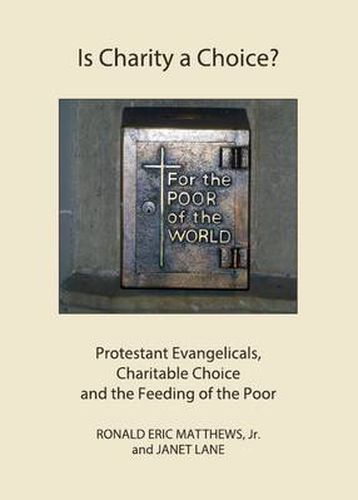Readings Newsletter
Become a Readings Member to make your shopping experience even easier.
Sign in or sign up for free!
You’re not far away from qualifying for FREE standard shipping within Australia
You’ve qualified for FREE standard shipping within Australia
The cart is loading…






Debates on public policy in the United States are shaped, in part, by moral and religious commitments of individuals and communities. Heclo (2003) writes in Religion Returns to the Public Square, Government policy and religious matters … both claim to give authoritative answers to important questions about how people should live. Heclo’s words apply especially to the issue of poverty and welfare reform, a matter on which the great religious traditions have played an integral part.Apart from its profound political significance, there is every indication that the welfare reform legislation of 1996 (Personal Work Opportunity and Reconciliation Act, PWORA) has altered the landscape of American religion. Through Section 104 of PWORA, also known as Charitable Choice, religious congregations, interfaith ministries and denominational work relief agencies have been thrust into the center of America’s welfare to work transition and community revitalization efforts. Charitable Choice makes it illegal for state governments to discriminate against social service providers who organization has a religious mandate.This book examines Charitable Choice - and more broadly, the changing relationship between religion and social welfare - as its primary point of departure for investigating faith-based poverty relief in the post-welfare era. This research employs a mixed methods approach to understanding the role of Protestant evangelicals in addressing the needs of the poor and specifically their role in the implementation of Charitable Choice. To accomplish this task, two national surveys, one individual and one congregational, are used to explore the role of religiosity and the creation of Protestant evangelical sub-cultures and their effects on civic engagement, volunteerism and support for Charitable Choice. It then triangulates this data with qualitative research to develop a clearer understanding of the issues that affect participation rates and public welfare delivery systems. In-depth interviews of thirty-six Protestant evangelical ministers from central Appalachia are conducted and analyzed. This text will advance both practice and theory by providing an understanding about the complex world of Protestant evangelicalism. This volume has the potential to increase our understanding about the role intra-textual and inter-textual theological beliefs and convictions play in the public policy process and whether faith-based organizations can help to address the issues surrounding poverty and social welfare. To the policy maker, the authors hope to provide practical information that affects policy delivery and policy evaluation. To the religious scholar and social science researcher, they hope this study serves as one brick in a larger foundation known as Protestant evangelicalism. It will provide a different strategy for identifying key variables associated with public policy analysis. And in the end, it will require us all to answer if charity is truly a choice.
$9.00 standard shipping within Australia
FREE standard shipping within Australia for orders over $100.00
Express & International shipping calculated at checkout
Debates on public policy in the United States are shaped, in part, by moral and religious commitments of individuals and communities. Heclo (2003) writes in Religion Returns to the Public Square, Government policy and religious matters … both claim to give authoritative answers to important questions about how people should live. Heclo’s words apply especially to the issue of poverty and welfare reform, a matter on which the great religious traditions have played an integral part.Apart from its profound political significance, there is every indication that the welfare reform legislation of 1996 (Personal Work Opportunity and Reconciliation Act, PWORA) has altered the landscape of American religion. Through Section 104 of PWORA, also known as Charitable Choice, religious congregations, interfaith ministries and denominational work relief agencies have been thrust into the center of America’s welfare to work transition and community revitalization efforts. Charitable Choice makes it illegal for state governments to discriminate against social service providers who organization has a religious mandate.This book examines Charitable Choice - and more broadly, the changing relationship between religion and social welfare - as its primary point of departure for investigating faith-based poverty relief in the post-welfare era. This research employs a mixed methods approach to understanding the role of Protestant evangelicals in addressing the needs of the poor and specifically their role in the implementation of Charitable Choice. To accomplish this task, two national surveys, one individual and one congregational, are used to explore the role of religiosity and the creation of Protestant evangelical sub-cultures and their effects on civic engagement, volunteerism and support for Charitable Choice. It then triangulates this data with qualitative research to develop a clearer understanding of the issues that affect participation rates and public welfare delivery systems. In-depth interviews of thirty-six Protestant evangelical ministers from central Appalachia are conducted and analyzed. This text will advance both practice and theory by providing an understanding about the complex world of Protestant evangelicalism. This volume has the potential to increase our understanding about the role intra-textual and inter-textual theological beliefs and convictions play in the public policy process and whether faith-based organizations can help to address the issues surrounding poverty and social welfare. To the policy maker, the authors hope to provide practical information that affects policy delivery and policy evaluation. To the religious scholar and social science researcher, they hope this study serves as one brick in a larger foundation known as Protestant evangelicalism. It will provide a different strategy for identifying key variables associated with public policy analysis. And in the end, it will require us all to answer if charity is truly a choice.